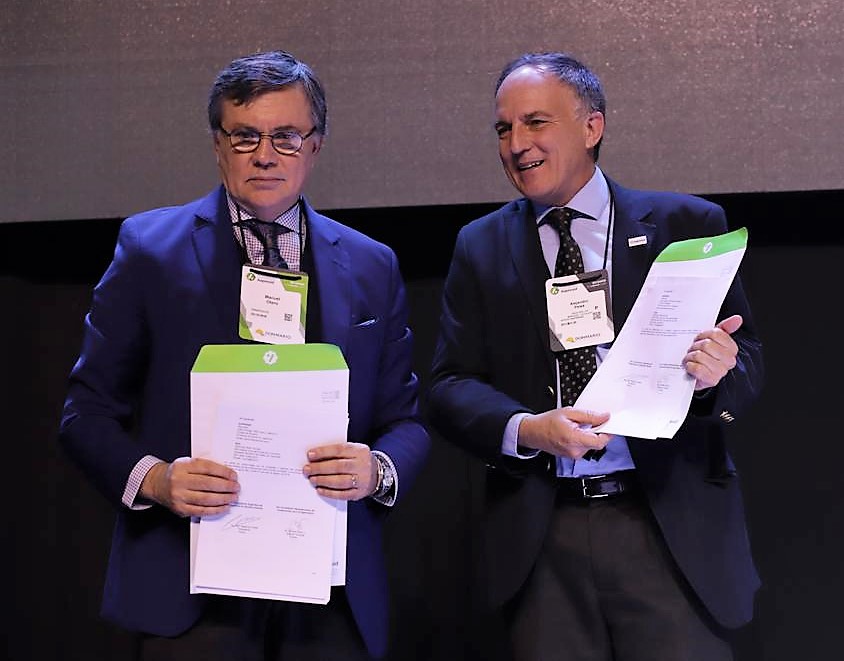Manuel Otero addressed the Congress of the Argentine No-Till Farmers Association (AAPRESID), where he called for the strengthening of supranational institutions to assist in tackling the devastating effects of climate change. He also urged countries with developed agriculture sectors to provide greater support to Central America and the Caribbean.

San José, 7 August 2019 (IICA). Manuel Otero, Director General of the Inter-American Institute for Cooperation on Agriculture (IICA), addressed the XXVII Congress of the Argentine No-Till Farmers Association (AAPRESID) on August 7 – an annual event focusing on knowledge application in agriculture, which is recognized as a network for updating and exchanging information on advanced technologies linked to the sustainable production of food, fibers and energy.
The conference was held in the Argentine city of Rosario, where Otero participated in the panel on “La realidad de las demandas globales en la Agenda ConCiencia para sustentabilidad” (“The Reality of Global Demands in the ConScience Agenda for Sustainability”), alongside Sergio Bergman, Argentina’s Secretary of the Environment and Sustainable Development; Britos Sergio, Director of the Center of Studies in Food Policy and Economics (CEPEA); and Mary Boote, Executive Director of Global Farmer Network. María Beatriz “Pilu” Giraudon, agricultural engineer and Honorary President of AAPRESID, was the moderator of the panel.
In his presentation, IICA’s Director General called for an increase in supranational institutions, referring to the challenges in the current multilateral system and the need to collectively tackle the demands imposed by climate change, while appealing to countries with advanced agriculture sectors and developed production systems to assist in developing the sectors in Central America and the Caribbean.
Otero remarked that, “We have Canada and the United States and northern Mexico that have hyper-advanced agriculture sectors, as well as Mercosur and Chile that have developed high-tech agricultural systems. Cooperation will be essential to awaken this sleeping giant of Mesoamerica and the Caribbean, in order to put it on its feet and to properly position our hemisphere as the true guarantor of the food and nutrition security and environmental sustainability of our planet”. He described IICA as “the platform and forum for agricultural issues in the Americas”.
Otero also signed an agreement with the President of AAPRESID, Alejandro Petek, under which IICA will serve as a hemispheric platform to assist in the expansion and dissemination of knowledge and technologies applied in agricultural and livestock farming.
AAPRESID is a not for profit non-governmental organization (NGO) made up of a network of agricultural producers, who based on an interest in soil conservation, have adopted and encouraged the dissemination of a new agricultural paradigm based on no-till farming.
This new approach to agriculture aims to boost productivity while avoiding the side-effects of tillage systems and is considered a genuine solution to the great dichotomy between production and sustainability that the human race is facing today: to produce food, fibers and biofuels, while maintaining a balance between economic, ethical, environmental and energy variables in society.

Otero remarked that, “This agreement is a testament to IICA intensifying its strategy to forge relationships with the private sector and, given our hemispheric presence, we will work with AAPRESID to disseminate environmentally-friendly technologies”.
The presentation also saw IICA’s Director General calling for a “staunch defense of the validity of the region’s production systems”, emphasizing agriculture’s role in mitigating phenomena such as rural migration.
“There were 8 million climate migrants between 2000 and 2018. We have to develop greater efficiency per production unit in order to face this type of phenomenon, for which agriculture can undoubtedly be and is part of the solution”, added Otero, who spoke about the importance that IICA is placing on the promotion of bioeconomy in the hemisphere.
In conclusion, IICA’s Director General maintained that, “This implies a new approach to agriculture that abandons the linear and predictable concept of raw material production to engage in biodiversity conservation and ecosystem services and in turn facilitates integration into industrial value chains”.
More information:
Institutional Communication Division, IICA.
comunicacion.institucional@iica.int











